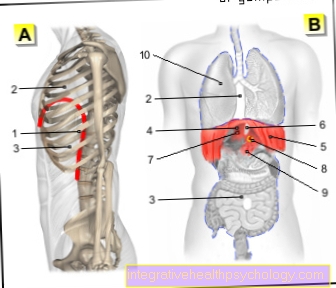Kindspech (Meconium)
Kindspech - what is it?
The first chair of the newborn is colloquially referred to as the child speck. Doctors speak of the so-called meconium, which comes from the Greek "mekonion" and means something like "poppy seed juice".
Read more on the topic: Defecation in the baby
.jpg)
Kindspech is usually eliminated from the newborn within the first 48 hours after birth. The greenish to black color is characteristic, which is caused by the increased content of Biliverdin, a breakdown product of the red blood pigment (hemoglobin), is conditional.
Kindspech is not a digestive product in the strict sense of the word, but rather a mixture of thickened bile and components absorbed with the amniotic fluid, such as hair or skin cells.
The accumulation of this meconium begins very early in pregnancy, around the tenth to fourteenth week of pregnancy. Correct stool elimination only begins when the newborn takes in food in the form of breast milk or substitute milk.
If the meconium does not stop within the first two to three days, a pediatrician should be presented. Because a lack of bad luck can indicate a disruption of the intestinal passage or even an obstruction (Ileus), which in turn requires further intervention or later clarification of the cause.
An ileus is an obstruction in the bowel. In the case of an intestinal obstruction, the intestinal passage is prevented. There is a build-up of stool and food. Symptoms are vomiting, severe abdominal pain and stool retention. If an intestinal obstruction is not treated, it will lead to fatal peritonitis. A meconium ileus is an obstruction of the bowel caused by the meconium. Adhesion leads to a disturbed intestinal passage.
Read more on this topic: Recognize the baby's meconium ileus and intestinal obstruction
If a newborn breaks down a greenish-black and very tough stool within the first few days of life, this is not worrying, but rather a sign of a well-functioning intestinal and excretory system.
Function of the meconium
The meconium excretes toxic substances that are broken down by the liver, as well as bile. In the meconium, residues of drugs that were consumed during pregnancy can be detected.
Read more on the topic: Meconium
Smell of the child bad luck
Although the child's woodpecker is greenish-black in color, which suggests that the smell is just as characteristic, it is odorless. This can in turn be explained by the fact that the meconium is not a real digestive product and therefore does not contain any intestinal bacteria that could produce an impressive odor.
The stool, which is deposited after the child's bad luck, smells depending on the food intake. If the newborn is breastfed, the stool tends to smell sour, whereas babies who are given replacement milk have a stool that smells rather unpleasant.
You might also be interested in this topic: Green stool in the baby
Release of meconium into the amniotic fluid / during childbirth
The amniotic fluid is usually clear or milky. However, if the child is given away prematurely before or during the birth, the amniotic fluid is cloudy from green to black.
Reasons for the premature elimination of Kindspech are various stressful situations to which the unborn child is exposed. The most common causes are an insufficient supply of oxygen (Hypoxia) or insufficient blood supply (Ischemia). In these situations there is a redistribution of the blood supply (centralization), which means that vital organs such as the heart and brain are better supplied with blood at the expense of the gastrointestinal tract. As a result, the bowel movement increases and the sphincter relaxes. The meconium gets into the fruit cavity and can be swallowed again together with the amniotic fluid.
Risk factors for premature meconium loss include difficult and prolonged labor, infection in the fetal period, mothers with diabetes or high blood pressure, and smoking, drugs or alcohol during pregnancy.
Risk of meconium aspiration during child birth
The premature deposition of meconium in the amniotic fluid creates the risk that contaminated amniotic fluid will be swallowed by the fetus. Aspiration is the unwanted inhalation of body fluids or foreign bodies. Not the swallowing itself, but the great danger of inhaling the meconium-containing amniotic fluid represents a threat to the child.
Since the meconium is colonized with intestinal germs such as E. coli and enterococci, there is a risk of pneumonia for the newborn if the meconium is inhaled. Under certain circumstances this can lead to blood poisoning.
Inhalation of amniotic fluid containing meconium
In up to four percent of unborn babies whose amniotic fluid is contaminated with meconium, this gets into the lungs through accidental inhalation through the windpipe (Meconium aspiration). The resulting clinical picture is accordingly Meconium aspiration syndrome (MAS) called.
Components of the Kindspech can do that Severely damage lung tissue. Acute can be a Shortness of breath occur. The newborn seems apathetic, breathes heavily and is smeared green. Usually the baby has to be as quick as possible intubated and ventilated become. It is also tried inhaled meconium suck off. Long-term damage is the tissue change in the lungs with overinflation (Emphysema). The however, most newborns recover well, no impaired lung function is observed in affected children in the long term. Just one There is a slightly increased risk of lung infections in the first year of life.
How often does the premature loss of meconium occur?
A premature departure of child bad luck in the mother's womb is not a rarity. An estimated 13% of all babies are born from amniotic fluid containing meconium. Only about 5-12% of these will develop a complication in the sense of a meconium aspiration syndrome (MAS), in which the contaminated amniotic fluid is accidentally inhaled.
Premature baby
Premature baby can also sell Kindspechas this is formed very early in pregnancy. However, premature babies present before the 32nd week of pregnancy not the classic risk group for premature meconium loss in the amniotic fluid and are therefore rarely affected by its complications. Rather, "transferred" unborn babies are affected, i.e. those who have stayed in the mother's womb for too long (over 42 weeks of pregnancy).





























